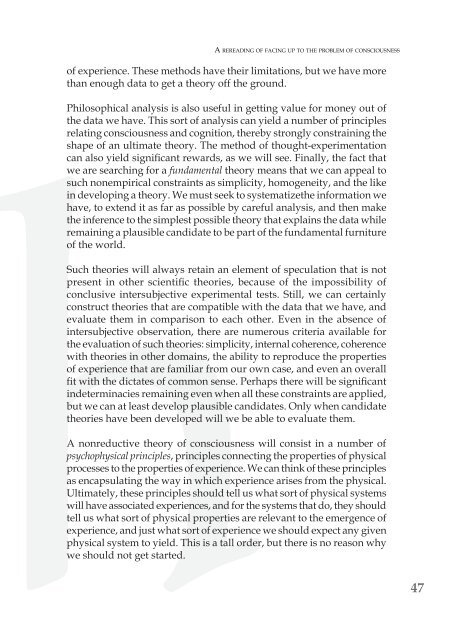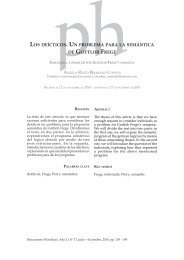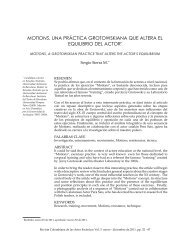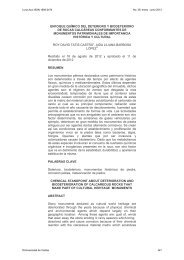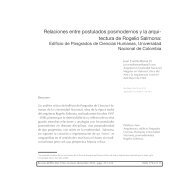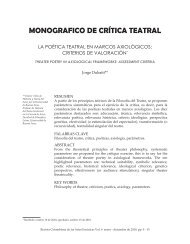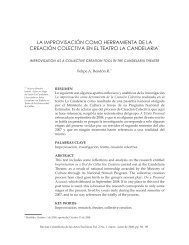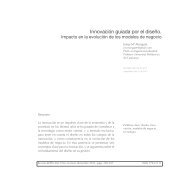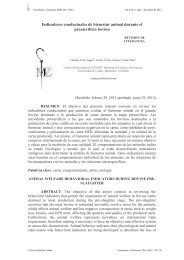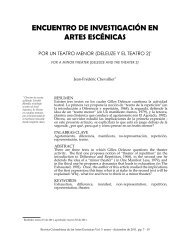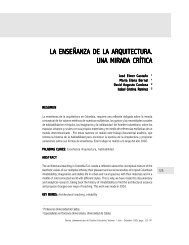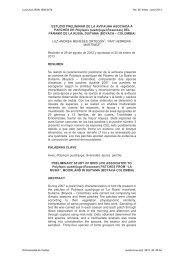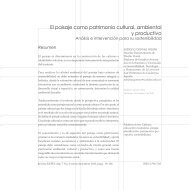Manizales - Colombia Año 12 No. 19 302 p. julio - diciembre 2011 ...
Manizales - Colombia Año 12 No. 19 302 p. julio - diciembre 2011 ...
Manizales - Colombia Año 12 No. 19 302 p. julio - diciembre 2011 ...
You also want an ePaper? Increase the reach of your titles
YUMPU automatically turns print PDFs into web optimized ePapers that Google loves.
A REREADING Of fACING uP TO ThE PRObLEm Of CONSCIOuSNESS<br />
of experience. These methods have their limitations, but we have more<br />
than enough data to get a theory off the ground.<br />
Philosophical analysis is also useful in getting value for money out of<br />
the data we have. This sort of analysis can yield a number of principles<br />
relating consciousness and cognition, thereby strongly constraining the<br />
shape of an ultimate theory. The method of thought-experimentation<br />
can also yield significant rewards, as we will see. Finally, the fact that<br />
we are searching for a fundamental theory means that we can appeal to<br />
such nonempirical constraints as simplicity, homogeneity, and the like<br />
in developing a theory. We must seek to systematizethe information we<br />
have, to extend it as far as possible by careful analysis, and then make<br />
the inference to the simplest possible theory that explains the data while<br />
remaining a plausible candidate to be part of the fundamental furniture<br />
of the world.<br />
Such theories will always retain an element of speculation that is not<br />
present in other scientific theories, because of the impossibility of<br />
conclusive intersubjective experimental tests. Still, we can certainly<br />
construct theories that are compatible with the data that we have, and<br />
evaluate them in comparison to each other. Even in the absence of<br />
intersubjective observation, there are numerous criteria available for<br />
the evaluation of such theories: simplicity, internal coherence, coherence<br />
with theories in other domains, the ability to reproduce the properties<br />
of experience that are familiar from our own case, and even an overall<br />
fit with the dictates of common sense. Perhaps there will be significant<br />
indeterminacies remaining even when all these constraints are applied,<br />
but we can at least develop plausible candidates. Only when candidate<br />
theories have been developed will we be able to evaluate them.<br />
A nonreductive theory of consciousness will consist in a number of<br />
psychophysical principles, principles connecting the properties of physical<br />
processes to the properties of experience. We can think of these principles<br />
as encapsulating the way in which experience arises from the physical.<br />
Ultimately, these principles should tell us what sort of physical systems<br />
will have associated experiences, and for the systems that do, they should<br />
tell us what sort of physical properties are relevant to the emergence of<br />
experience, and just what sort of experience we should expect any given<br />
physical system to yield. This is a tall order, but there is no reason why<br />
we should not get started.<br />
47


